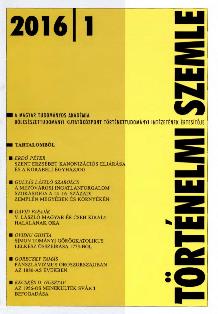 The first issue of Historical Review for 2016 has been published.
The first issue of Historical Review for 2016 has been published.
Péter Erdő’s study aimed at exploring the possible divergences and defects of the process with regard to the contemporary state of the canonization process. It was seeking answer to the question whether the process itself, in terms of its whole course and final result, was in keeping with contemporary prescriptions. László Szabolcs Gulyás’ essay explores the content of the customary law and its practical application in the market towns of northeastern Hungary in the late middle ages. The purchase, exchange, mortgage, alienation and bequest of real estate, as well as their offer to ecclesiastical institutions as pious donation was a general phenomenon in late medieval Hungarian market towns. Free disposition of various pieces of property – plots, houses, arable, mills, pasture, and before all vineyards – was an everyday and widely accepted occurrence. Supervision of real estate trade was a basic duty of the town council, a task it discharged on the basis of the town’s own customary law. Tamás Goreczky’s paper is primarily concerned with the internal and foreign affairs of Russia in the 1880s with a particular focus on one of the influential political phenomena of the decade, Pan-Slavism. The paper provides an overview of the Pan-Slavic movement and its politicians in the aforementioned time span, predominantly based on the reports of István Burián, the Austro-Hungarian consul general in Moscow. Gusztáv D. Kecskés’ study summarises what the Swiss authorities did in order to secure the reception of the refugees, the ways in which the local society reacted to the crisis, and the results that were yielded by the efforts. The conclusion of the author is that while the Swiss response perfectly fits into the general policies of the West, some local characteristics can also be grasped. He regards as the chief feature of success Cold War opposition and the determined governmental will which derived therefrom.
CONTENTS
STUDIES
Péter Erdő: The Canonization Process of Saint Elisabeth and Contemporary Canon Law
László Szabolcs Gulyás: The Customary Law of Real Estate Trade in Market Towns in the 14th to 16th Centuries. The Case of Zemplén County and its Region
Tamás Goreczky: Pan-Slavism in Russia in the 1880s in the Reports of István Burián, Austro-Hungarian Consul General in Moscow
Gusztáv D. Kecskés: The Swiss Reception of Hungarian Refugees in 1956
WORKSHOP
David Papajík: Solving the Problem of Establishing the Cause of Death of Hungarian and Czech King Ladislav V
Ovidiu Ghitta: The Lessons of an Extraordinary Conscription. The Census Record of Simon, Greek-Catholic Priest of Tomány, from 1773
József Pap: The Voters of Eger in the Middle of the 19th Century
Tibor Dömötörfi : German Ethnic and Racial Politics in Hungary during World War II
Történelmi Szemle (Historical Review) is a periodical of the Institute of History of the Research Centre for the Humanities at the Hungarian Academy of Sciences. The language of the journal is Hungarian, but each article includes an abstract in English. Subscriptions can be made at any Hungarian post office, but issues of the journal (including older issues) can be bought or ordered from the Institute as well (postal address: MTA BTK Történettudományi Intézet, 1014 Budapest, Úri u. 53.; telephone: 224-6700/626; e-mail address: ).



